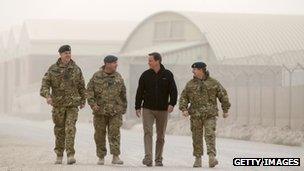David Cameron visits UK troops in Afghanistan
- Published
David Cameron meets British Tornado pilots at the Nato base in Kandahar
Prime Minister David Cameron has made an unannounced visit to UK troops in Afghanistan.
But due to a dust storm, he was unable to fly to Camp Bastion - the main British base - and was diverted to the Nato base in Kandahar.
There he met British Tornado pilots - some of the 9,500 UK servicemen and women currently serving in the country.
The trip came as the government said it was creating a cabinet committee with responsibility for the armed forces.
Mr Cameron will chair the first meeting early in the new year.
Speaking to reporters in Kandahar, the PM discussed the role the committee would play in a new cross-government effort to improve the welfare of British troops, and repeated his commitment that the UK's combat role in Afghanistan would be over by the end of 2014.
'No point whingeing'
In Kandahar, Mr Cameron met members of RAF 12(B) Squadron - from RAF Lossiemouth in Scotland - who fly the Tornado fighter jet on missions all over Afghanistan.
He also met US General James Huggins, the head of Isaf Regional Command South, for talks on the Nato mission in Afghanistan.
Speaking to journalists, the PM said it was "disappointing" not to reach Camp Bastion, but said there was "no point whingeing about it" and said it had given him the opportunity to meet service personnel he would not usually see.
"You just have to take it as it comes in this job," he said.
"What we have experienced today is what people working out here experience the whole time."
Another trip by Mr Cameron to Afghanistan last year was disrupted by a security alert, but the PM said: "You just have to take the rough with the smooth - I don't feel particularly jinxed."
Some 500 British servicemen and women are due to be brought home from Afghanistan in 2012 and the PM indicated that more would leave in 2013.
He would not be drawn on the exact timetable for UK withdrawal, but said: "I don't want to see some massive cliff edge in 2014 - I don't think that's practical.
"But I don't think we need to make hard and fast decisions at this stage."
'Difficult decisions'
He said British troops would not be used to infill behind other Nato troops when they were withdrawn - instead Afghan personnel would take their place.
The BBC's political correspondent Carole Walker, who is travelling with the prime minister, said the visit came at a time when the armed forces were facing redundancies and a pay freeze.

The dust storm greatly reduced visibility and made it too dangerous for the PM's flight to go ahead
She said that despite those difficulties, Mr Cameron wanted to stress his personal commitment to ensuring that all those who remained in the armed forces had better access to services like education and healthcare.
The PM told reporters: "There's more that needs to be done, not just by the government but by the whole country, to recognise the service and sacrifice of our armed forces, but I think we've made some good progress this year."
He said the government had made "difficult decisions right across public spending", but the armed forces had been protected from some changes - such as a rise in pension contributions.
He added that he was "passionate" about the military covenant - the obligation owed by the nation to its troops - and had written it into law for the first time.
A report published alongside the announcement about the committee listed some of the steps the government says it has taken to improve armed forces' welfare, such as doubling to tax free operational allowance.
But Labour said the "self-congratulatory report misses out the fact that the services have been subject to a triple whammy of cuts to pay, pensions and allowances which has deeply hurt forces and their families' living standards and morale".
Shadow defence secretary Jim Murphy said his party welcomed any additional resources for military personnel, but said 2011 had been "a year of disappointment and worry for our forces" as a result of government policy.
- Published20 December 2011